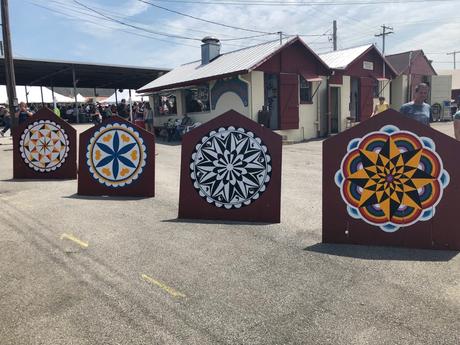The whole ox on a spit was kind of disturbing, but there’s nothing artificial about folk tradition. We’d come to take in a bit of the Kutztown Folk Festival. The crowds weren’t excessive, and we wore masks if the conditions warranted it. The oldest continually operated folk festival in the country, this July event is a celebration of Pennsylvania German heritage. In addition to the usual kinds of festival vendors were a number of specifically folk artists—quilters and hex sign painters prominent among them. It’s difficult to find a good sarsaparilla anywhere else these days. We wandered around, watching an old-fashioned hay bailer at work, appreciating the time various craftspeople put into their art, taking in a quilt auction. (I can’t even imagine having a spare few thousand on hand to buy a quilt, but obviously others can.)

Although mostly white—those of us with blue eyes may have been in the majority here—there were those of various ethnic backgrounds around, enjoying the ethos. What struck me upon hearing one of the singing, folklore groups telling about Pennsylvania German (commonly called Pennsylvania Dutch) traditions is that this may be one reason people fear the current emphasis on multiculturalism. It’s fairly rare to hear anyone speaking proudly of being a German, even though Germany seems to be one of the least fascistly inclined countries these days. Even a dominant culture is afraid of losing a sense of self. It seems to be a uniquely human problem. That ox on a spit really bothered me.
While I’m an American mutt, about half of my DNA is fairly solidly teutonic. Although I was born in Pennsylvania and my grandmother still spoke German, we weren’t Pennsylvania Dutch. A second-generation American, my grandmother was from Washington, DC. My germanic grandfather was from upstate New York. They just happened to settle in Pennsylvania late in their lives. Still, I felt a strange kind of kinship to those explaining German food—heavily meat-based—and hex signs on barns. I grew up seeing the latter, and it never occurred to me that while living in the Midwest they simply weren’t there. I didn’t grow up on a farm—we lived in a cheap apartment—and we never talked of German tradition at home. No, like the blacks, and south Asians, and those, like me, of clearly mixed descent, that I saw there, we were all simply Americans. That’s what folk festivals are all about—celebrating who we are.
